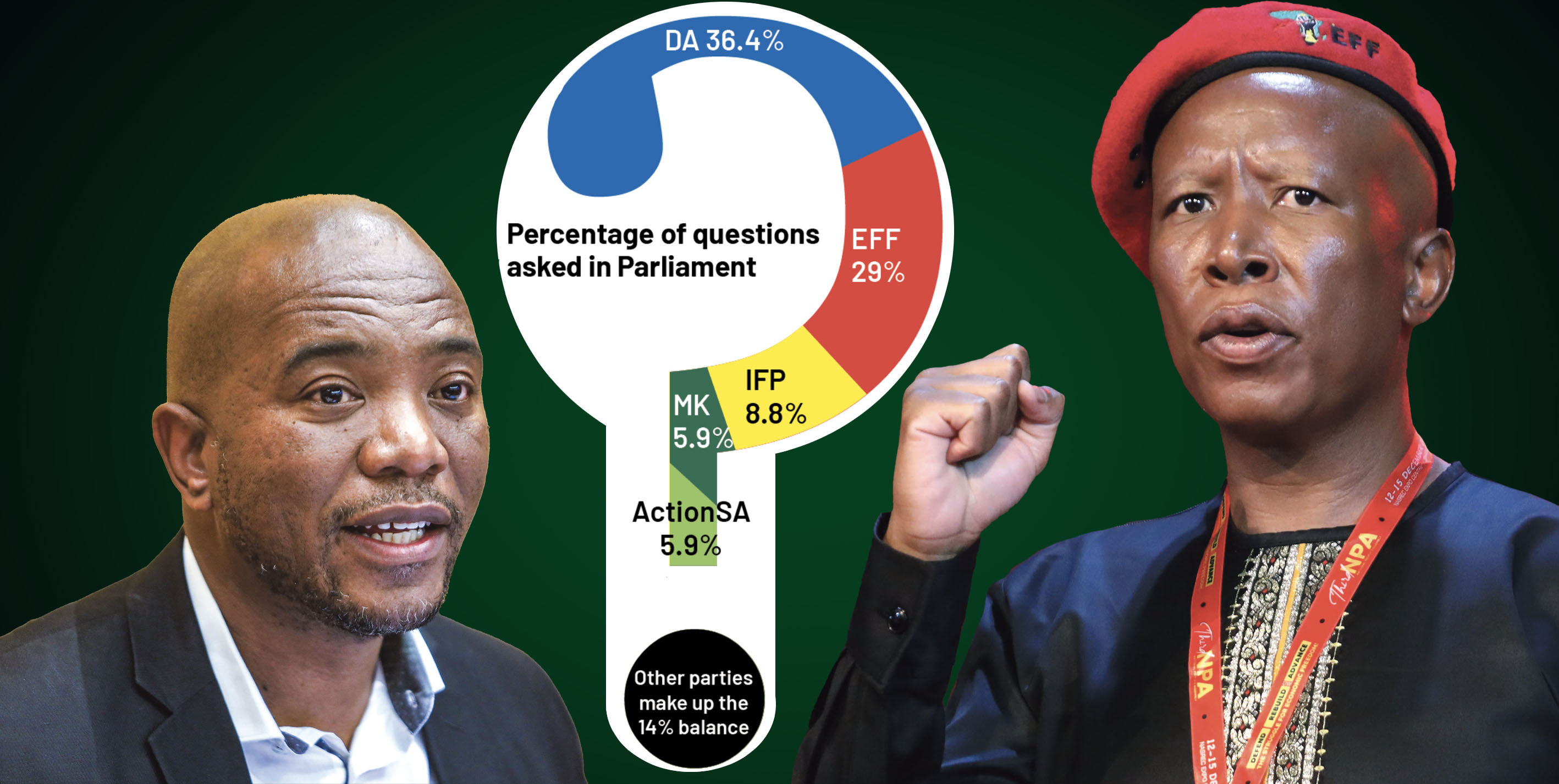The role of the opposition in a National Assembly whereby 70% of it is part of the national unity government (GNU) is still being figured out – that much is clear.
uMkhonto Wesizwe (MK) is the largest party not in the GNU and has taken on the mantle of being the official opposition from the DA – a position the latter had held for 25 years. MK, along with the EFF, National Coloured Congress, African Transformation Movement and the United Africans Transformation, represents inherently divisive populist agendas and together the parties have formed the progressive caucus.
This caucus of largely populist and anti-constitutional political parties has 102 seats in the 400-strong National Assembly. On the other side of the House, the 10-GNU parties hold 287 seats.
Between the progressive caucus and the GNU bloc are ActionSA, Build One South Africa (Bosa) and the ACDP, which together have only 11 seats in the National Assembly.
As Marianne Merten has pointed out, the seventh Parliament has an opportunity to turn over a new leaf – to move from box-ticking monitoring to proper oversight and accountability. A strong opposition is crucial to a thriving democracy. But the sense from MPs is that a weakened opposition has emerged in the post-poll Parliament.
‘Not present’
At a press conference presenting its Parliament Wrapped on 9 December, members of the DA said they believed the opposition had been “weakened” post-elections.
“In my view, the opposition in South Africa has all but collapsed,” said DA chief whip George Michalakis. He said that MK and the EFF, specifically, were not “an effective opposition”.
“They’re not a present opposition in Parliament. When we were the official opposition, those benches used to be chock-a-block and the ANC benches used to be relatively empty. What we’ve seen over the last two weeks is the government benches – ANC and DA – and the smaller parties being full, and MK and the EFF being largely absent,” he said.
The ACDP’s parliamentary whip, Steve Swart, agreed that the state of the opposition had been hollowed out with the DA, IFP and FF Plus taking up positions in the government benches. He said this had been “exacerbated by the lack of experience” of MK party MPs, as well as the “weakening” of the EFF.
Speaking to Daily Maverick, ActionSA’s parliamentary leader Athol Trollip said “there’s no doubt that there’s a big void” in Parliament because MK has not stepped up to the plate as the official opposition.
“They simply just oppose everything, and it’s quite clear when it comes to voting that they’ll just vote against everything. They’ll even just cut off their nose to spite their face, which is not an effective way to be a proper opposition,” said Trollip.
 Former Western Cape judge president and MK party leader in Parliament John Hlophe during the swearing-in ceremony of the party’s members on 25 June at the Good Hope Chamber in Cape Town. (Photo: Brenton Geach / Gallo Images)
Former Western Cape judge president and MK party leader in Parliament John Hlophe during the swearing-in ceremony of the party’s members on 25 June at the Good Hope Chamber in Cape Town. (Photo: Brenton Geach / Gallo Images)
uMkhonto Wesizwe
However, MK party deputy president John Hlophe told Daily Maverick it had been a “successful” few months for the MK in Parliament.
“Now, we are not accountable to the DA – they must shut up. They are in government, controlling the ANC through the so-called GNU… Whether the DA likes our progress or not – they can go to hell and we’ll show them the nearest way to hell.”
He acknowledged that the party had experienced certain “challenges” upon entering the House – it arrived late after it boycotted the first sitting of the National Assembly, the majority of its MPs were parliamentary newcomers and needed to “learn the ropes quickly and join the race”, and it suffered from “internal squabbles and challenges”.
“I’m glad to say despite all those challenges, we have emerged as a unit and as a strong opposition, as far as we’re concerned. This explains why the MK has been growing in size. It’s largely because … our voters are aware of the work that we do in Parliament and they are happy with the progress,” said Hlophe.
As Rebecca Davis pointed out, MK’s not-so-subtle strategy in Parliament is less about holding the government to account, and more about revisionism of the Zuma era. However, the MK MPs have thus far shown little appetite for the kind of politics of distraction practised by the EFF in the National Assembly.
In certain parliamentary committee meetings, it is MK MPs who make some of the most substantive contributions. Former Eskom CEO and alleged State Capturer Brian Molefe, for example, have been singled out for asking good technical questions in the energy portfolio committee.
If one puts aside their alleged criminality, the former chief executives of state-owned enterprises implicated in fraud and corruption, Molefe, former Prasa CEO Lucky Montana and former Transnet CEO Siyabonga Gama bring technical expertise to their parliamentary oversight. But the MK party’s underlying project of historical revisionism strips some of the authenticity of its MPs’ contributions.
Red berets
Parliament is by and large a political institution and, since the arrival of the EFF in 2014, also a site of political spectacle and disruption. Despite the High Court in Cape Town finding in June that the EFF doesn’t have the right to disrupt parliamentary proceedings, the theatrics have continued.
In September, Julius Malema and EFF MP Omphile Maotwe were thrown off a virtual session for repeatedly referring to Sport, Arts and Culture Minister Gayton McKenzie as a pantiti (jailbird).
It’s been a year of turmoil for the Red Berets. Once the third-largest party in Parliament, the EFF crashed to fourth position, losing five seats after the 2024 elections. After its showing in the May polls, key EFF figures Floyd Shivambu, Busisiwe Mkhwebane and Mzwanele Manyi defected from the party and crossed political lines to join the MK.
The view from several MPs is that the internal ructions in the EFF have distracted from its work in Parliament.
“MK has not stepped up, it hasn’t really been able to hold a candle to what the DA used to do, and the EFF has been a bit distracted. Malema’s been a bit distracted, he’s hardly been in Parliament. His team’s been a bit decimated and just hasn’t performed like it used to. So the opposition, the major opposition bloc, has not been strong,” said Trollip.
However, Malema has a 67% committee attendance rating on the People’s Assembly website – significantly better than his attendance in previous years. The EFF, with its 44 MPs in the sixth administration, had one of the worst records for parliamentary committee attendance.
A good measure of oversight commitment and enthusiasm is written questions, as individual MPs put these questions into the parliamentary system. According to figures obtained from the Parliamentary Monitoring Group, a total of 1,725 written questions were submitted to ministers between 18 July and 1 November.
“The DA has submitted 36.4% of the total written questions from the NA, with 628. The EFF is close behind, submitting 29% of questions asked, with 504, but due to the number of seats, its MPs submit more questions per MP than the DA,” the group told Daily Maverick.
In comparison, MK and ActionSA, which hold 58 and six seats in Parliament respectively, each submitted 101 written questions.
Outside Parliament, the EFF has petitioned the Constitutional Court to revive accountability on the Phala Phala matter. The party launched a court bid in February against the National Assembly’s rejection of the report that could have led to an impeachment inquiry into President Cyril Ramaphosa. The matter was heard on 26 November and judgment has been reserved in the case.
Daily Maverick tried to contact the EFF for comment on several occasions, but it did not respond to calls or text messages.
‘Centrist opposition parties’
The ACDP has about 60 years of parliamentary experience between its three MPs. ACDP MP Steve Swart told Daily Maverick the party has played a “significant role thus far” in the seventh Parliament.
“The ACDP definitely believes that being an opposition party with several MPs who have extensive experience in Parliament, who know Parliament and understand how things work, we will contribute to help rebuild the opposition into a strong force that can hold the GNU accountable, like opposition benches have done previously,” said Swart. He pointed to the party posing several questions to the executive relating to foreign migrants receiving social grants, issues over the Stats SA census, as well as water-related queries.
Swart said the ACDP and parliamentary newcomers ActionSA and Bosa have played a “strong constructive role as centrist opposition parties”.
ActionSA holds the most seats of the three parties in the National Assembly. The party’s “super six” MPs each have two main portfolio committees and a third alternate portfolio, according to Trollip.
After the formation of the GNU, ActionSA said it would not join the coalition government and would hold the position as the rational centre in the “opposition void”.
“I made a commitment that we’ll be a constructive opposition. We’ll support the GNU where we can in the interest of South Africa, and we’ll oppose where we must,” Trollip told Daily Maverick.
ActionSA has pushed for accountability on key issues, including calling for former justice minister ThembiSimelane’s removal from Cabinet and political party funding disclosures. The party filed a complaint against Simelane with the Public Protector in August, after a Daily Maverick and News24 investigation revealed that Simelane had received a “loan” from a company that had brokered investments with VBS Mutual Bank.
On 3 December, the Office of the Public Protector confirmed that it was investigating ActionSA’s complaint of “improper conduct” regarding the money Simelane took from Gundo Wealth Solutions.
“I don’t think any party has driven that matter [Simelane] as hard as we have,” Trollip told Daily Maverick.
Committee chairpersons are central to directing the work of parliamentary committees, and the depth of oversight. Arguably the biggest win for Bosa’s Mmusi Maimane upon entering Parliament has been securing the chair of the standing committee on appropriations.
This is an extremely significant committee, and there was broad consensus that Maimane was an excellent choice for the role as an individual who can be trusted to scrutinise the use of government funds, Daily Maverick’s Rebecca Davis reported.
Maimane believes his chairmanship of the committee has been a game-changer in holding the GNU to account. “I’ve demanded accountability on the budget process, but also on other issues which have come up – we did oversight on Eskom around load shedding and its financial position,” he told Daily Maverick.
But Bosa has only two MPs in Parliament, which restricts how much it can do. “From my perspective, from a parliamentary point of view, even though we have two seats, we’ve been able to be effective at not only the question-asking, but also in making sure that from an appropriations point of view, we use that role in the most effective way,” said Maimane. DM
This story first appeared in our weekly DM168 newspaper, available countrywide for R35.





 Former Western Cape judge president and MK party leader in Parliament John Hlophe during the swearing-in ceremony of the party’s members on 25 June at the Good Hope Chamber in Cape Town. Photo: Brenton Geach / Gallo Images
Former Western Cape judge president and MK party leader in Parliament John Hlophe during the swearing-in ceremony of the party’s members on 25 June at the Good Hope Chamber in Cape Town. Photo: Brenton Geach / Gallo Images